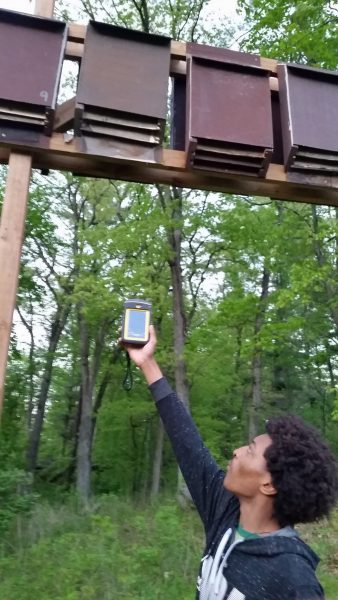 In May 2017, the research team at Upham Woods was awarded funding through the Wisconsin Citizen-based Monitoring Partnership Program for their project “Bat Monitoring and Interpretation Along the Wisconsin River.”
In May 2017, the research team at Upham Woods was awarded funding through the Wisconsin Citizen-based Monitoring Partnership Program for their project “Bat Monitoring and Interpretation Along the Wisconsin River.”
This funded project provides resources to enhance the existing bat ecology program at Upham Woods as well as support citizen science efforts to monitor bat populations along the Upper Dells corridor of the Wisconsin River.
Acoustic bat monitoring equipment was acquired which recognizes supersonic frequencies & match them to different species of bats, generating maps that identify their location and species/group. Use of this specialized equipment allows citizen-scientists to collect data both by the acoustic and the roosting methods. They will begin to have a deeper understanding of bat ecology, what is harming bat populations, current scientific tools that capture information about the bat populations, and ways they can help bats in their own yard. Additionally, in Fall 2017, bat houses were installed by students and adult volunteers as part of a service learning experience, allowing onsite visitors to monitor bat populations as they roost over the summer.
Upham Woods staff is currently developing support materials to enhance the existing Bat Ecology Program offered, as well incorporating acoustic bat monitoring equipment into the popular Night Hike curriculum, taking the experience of a stroll in the woods on summer evening to a new level of awareness.
Bat monitoring will be incorporated into training new summer staff in June 2018; all those interested in this equipment or in learning more about local bat populations will be encouraged to attend these training sessions. Once trained, citizen-scientists will be encouraged to borrow the equipment to monitor other geographic areas.
On June 23, 2018, bat monitoring will be a major component of the BioBlitz event hosted at Upham Woods. Volunteers and natural resource enthusiasts will gather together to inventory all the different organisms that live Blackhawk Island. Citizen science events like these continue to be an important way to gather real-time information about the world and ecosystems around us, while also inspiring the idea that any person can make scientific discoveries.



